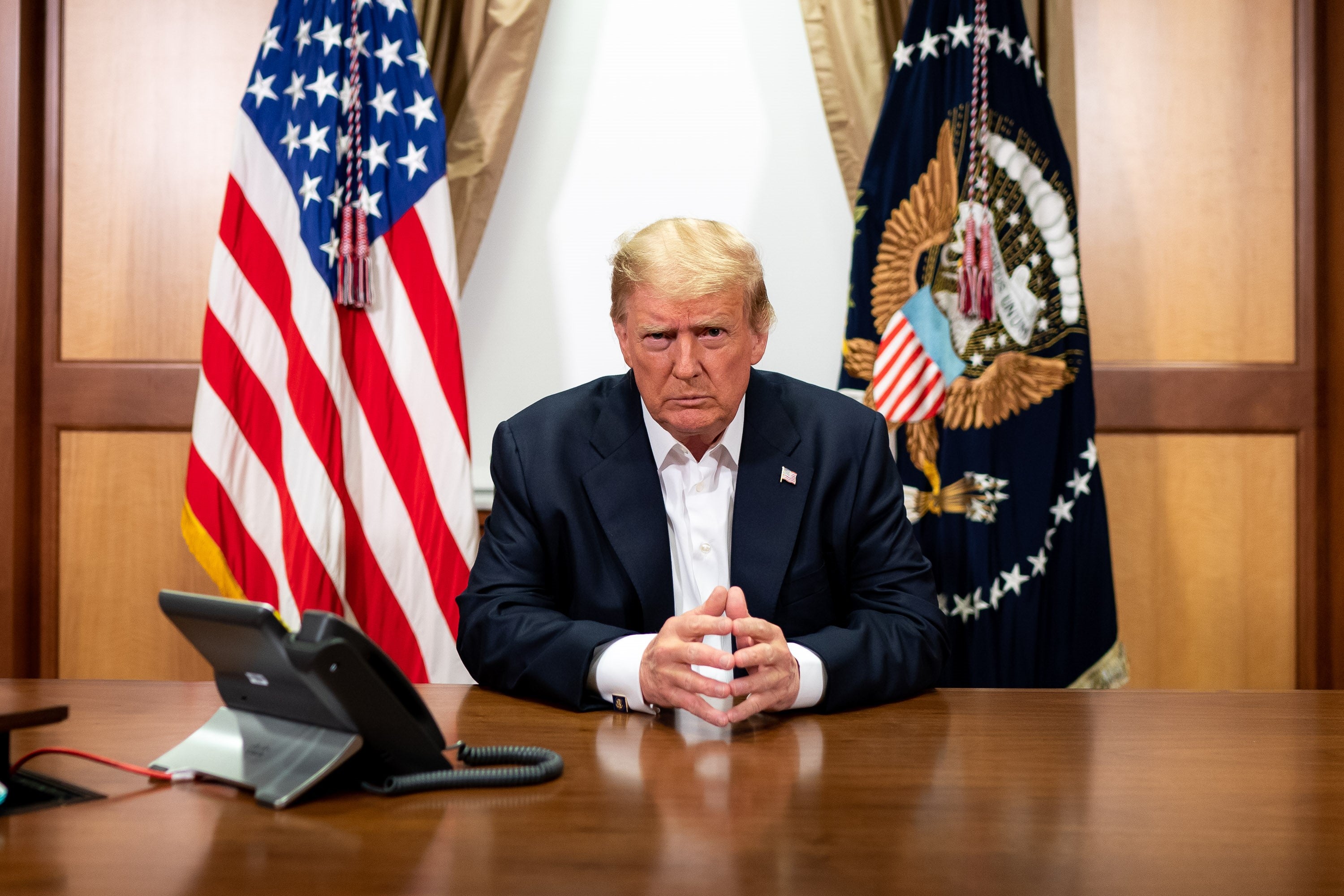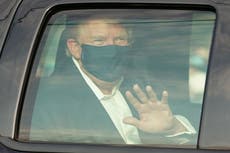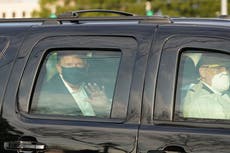How America’s enemies could take advantage of Donald Trump’s illness
President’s coronavirus diagnosis could add to growing global tensions

“Any adversary who views news of @POTUS testing positive as an opportunity to test the United States would make a grave mistake,” Marco Rubio, the acting chairperson of the Senate Intelligence Committee, tweeted following Donald Trump’s admission to hospital.
Trump’s illness has greatly added to the continuing turbulence in an America already in crisis with more than 217,000 dead from the pandemic; months of violence during protest marches; and a bitter campaign leading up to an election the result of which the president has threatened not to accept.
This is an ideal scenario for America’s enemies to exploit, security and diplomatic analysts point out. US officials say they are aware of the danger and are taking the necessary precautions. Colonel David Butler, spokesperson for the Joint Chiefs of Staff, wanted to assure “the US military stands ready to defend our country and its citizens. There’s no change to the readiness or capability of our armed forces”.
But there is always, in these volatile circumstances, the “law of unintended consequences” - a miscalculation triggering a series of reactions which could lead to confrontation or possibly even a conflict.
China’s muscle-flexing in disputed seas, its repeated military exercises near Taiwan, may lead to an escalation of tension and an American reaction. There is near certainty of Washington taking action if Iran chooses this moment to retaliate for the assassination of General Qassem Soleimani with attacks on American targets. Russia may attempt to test the resolve of western allies through aggressive hybrid offensives using cyber attacks.
The uncertainty has been heightened by contradictory accounts about the gravity of Trump’s illness.
The president’s chief of staff, Mark Meadows, told White House reporters that Trump’s “vitals over the last 24 hours were very concerning” and “we’re still not on a clear path to recovery”. White House staff said that he “had a fever and his blood oxygen levels were dropping rapidly”. There were reports that Trump had asked “am I going to die?” and wondered if he would “go out” like his friend Stan Chera, a 77-year-old who died from the virus in April.
The president was said to have become “livid” about Meadows warning, and the chief of staff has since backtracked on Fox News, saying the prognosis was much better. The White House physician, Sean Conley, has stated that the president made “substantial progress since diagnosis”, was “fever-free and off supplemental oxygen”.
Trump has since then posted a four minute video on Twitter saying he was “starting to feel good” but adding “you don’t know, over the next period of a few days, I guess that’s the real test. So we’ll be seeing what happens over those next couple of days”. On Sunday he made a public appearance in a drive-past to greet supporters, a move which led to criticism from doctors.
One repercussion of the journey is that all those in his motorcade may need to go into isolation. According to the Washington Post, one angry member of his secret service detail said “he’s not even pretending to care now”. A former member of the service asked “where are the adults?”
There are claims that Trump may be released from the Walter Reed Military Medical Centre on Monday. But these have been greeted with scepticism, and, even if he is released, the state of his health is likely to remain unclear.
“With the president’s illness amid a divisive campaign, we should not discount the possibility that China will step up pressure on Taiwan or Russia will seek to take advantage in eastern Europe. "Important the US signal to both that we are watching and remain fully capable,” tweeted Nicholas Burns, a former senior State Department official.
Colin Clarke, a senior research fellow at the security think-tank, the Soufan Centre, commented: “The biggest question mark now is adversaries’s perception of how vulnerable the president is. A major US adversary could miscalculate and see this as an opportune [moment] to do something they were already planning to do – for example, is this an opportune time for [Russian president] Vladimir Putin to make a move because he thinks the president is distracted?”
There is also concern about decisions which may be made in the White House by a president who has had to be talked out of ordering military attacks in instant responses to events in the past.
The alarming habit was noticed early in his term. By October 2017 three former generals serving in his administration – James Mattis, John Kelly and HR McMaster - were reported to have a pact not to be abroad at the same time. At least one will stay behind, they had decided, as a check against the wilder actions of the president.
But countries China, Russia etc need to be careful about what they do in the coming days and weeks, what they do may have unforeseen results
Some critics hold that Trump may seek to shore up his plummeting figures in the polls by welcoming the chance of an armed confrontation and showing himself to be a leader staunchly defending his country while ill.
“That would be a high-risk tactic,” held Robert Emerson, a British security analyst. “Would voters hit by coronavirus, the protests, the grim economic situation, really want the country to drift into another conflict? But countries [like] China, Russia etc need to be careful about what they do in the coming days and weeks, what they do may have unforeseen results."
Senior Pentagon officials met the president recently in the White House in an event for veterans’s families. Defence secretary Mark Esper has subsequently tested negative, as has the chairperson of the Joint Chiefs of Staff, General Mark Milley.
The National Security Council (NSC), part of a structure which evolved after a former president, Franklin Roosevelt, was viewed to be making too many security and foreign policy decisions without consultation, will continue to meet. But in a departure from the Trump administration’s public scepticism about masks and the pandemic, all NSC staff have been asked to wear masks in all White House common areas.
National security advisor, Robert O’Brien, a Trump loyalist, has also tested positive for coronavirus.
Join our commenting forum
Join thought-provoking conversations, follow other Independent readers and see their replies
Comments


Bookmark popover
Removed from bookmarks